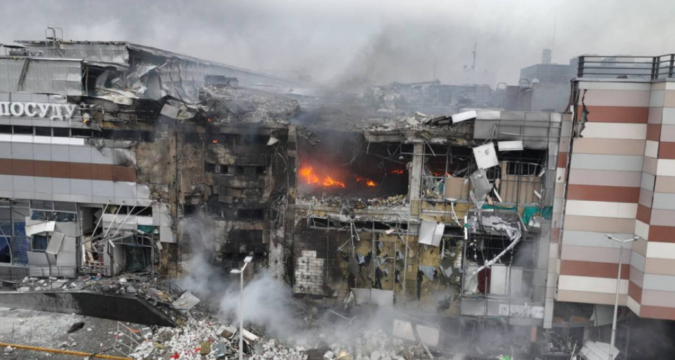
The airstrike in Pokrovsk town damaged a transit center “where people already fleeing for safety had sought shelter,” said UN Resident Coordinator Matthias Schmale.
He emphasized in a statement that international humanitarian law, “which must be adhered to,” protected individuals and civilian infrastructure, including humanitarian institutions.
According to humanitarian partners on the ground, houses and schools were damaged in the last week’s devastating strikes in Pokrovsk, as well as the villages of Myrnohrad and Toretsk, UN Spokesperson Stéphane Dujarric told reporters in New York.
During the daily briefing, he stated, “Myrnohrad aid workers responded by delivering emergency materials and providing psychosocial support to impacted people.” “Our humanitarian colleagues observe that daily threats to civilian safety and hostilities in Ukraine affect civilians, including humanitarian workers.”
Assistance for retirees
In a similar incident, the UN World Food Programme (WFP) declared that crucial financial aid had been provided to almost 500,000 elderly residents residing close to Ukraine’s front lines.
The WFP program is funded by a number of EU member states as well as private donors and is implemented in collaboration with the Ukrainian government. In the past year, the government has given nearly $50 million to pensioners who get less than $81 per month.
Along with other aid, the UN organization delivers food boxes in the areas closest to the front lines, “where food is hard to find or very expensive,” and it serves 90,000 kids nationwide hot lunches every day.
Two and a half years after the full-scale Russian invasion, the UN migration agency IOM issued a warning that ongoing hostilities in Ukraine “continue to harm civilians, damage homes, and disrupt vital services.
UN human rights office spokesman Liz Throssell described the plan by the Nicaraguan government to outlaw an extra 1,500 civil society organizations—of which half are religious associations—as “deeply alarming” on Tuesday.
This is especially true in light of the country of Central America’s “fundamentally eroded civic space in recent years” and the unjustified limitations on religious freedom.
With the most recent closure orders released on Monday, the Daniel Ortega government has now revoked the legal status of nearly 5,000 organizations, including NGOs, media outlets, and private universities—mmost of them since June 20, 2022’s end.
Takeover by the government
“All of their assets are under government control,” according to Ms. Throssell, and the drastic effects of these actions “make the defense of human rights increasingly difficult in Nicaragua.”
Out of a fear of being shut down, it has also caused some civil society organizations that are still in operation to censor their own operations.
DR Congo’s North Kivu continues to be rife with misinformation that fuels bloodshed
Disinformation, false information, and hate speech continue to fuel violence and societal disintegration in the unrest-plagued North Kivu region, according to a statement released on Tuesday by MONUSCO, the UN’s peacekeeping efforts in the Democratic Republic of the Congo (DRC).
Peacekeepers are responsible for defending people in the eastern Democratic Republic of the Congo (DRC), where several armed groups are still engaged in combat with government forces and attacking civilian targets.
UN Spokesperson Dujarric informed reporters on Tuesday that peacekeepers had been sent to Gina in North Kivu in response to reports that an armed group from Zaire had encircled the local office of the Congolese National Police.
Peacekeepers act as disincentives
In tight coordination with the Congolese Armed Forces, “UN peacekeepers deterred the Zaire armed group fighters, prompting the Zaire fighters to withdraw,” he continued.
In addition, MONUSCO sent a patrol to the Kwe mining site in the Ituri province, close to Bunia, following an attempted attack by members of the armed CODECO group.
Meanwhile, the Mission reports on the ongoing spread of hate speech, disinformation, and false information, especially in connection with the M23 rebellion in North Kivu, jeopardizing the region’s social cohesiveness and security,” Mr. Dujarric continued.
In response, MONUSCO arranged a dialogue conference in the regional hub of Goma for over one hundred local media and opinion leaders, with the aim of “promoting responsible reporting that supports peace and stability in the region.”